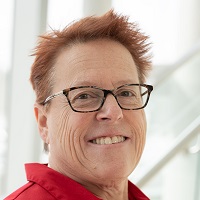Lisa Cavacini, PhD
 By Merin MacDonald | Date published: January 14, 2025
By Merin MacDonald | Date published: January 14, 2025
January Researcher Spotlight: Lisa Cavacini, PhD
Lisa Cavacini, PhD, professor of medicine in the Division of Innate Immunity, excelled in science in high school which led to a pre-med major in college. As she looked at course offerings in her final year of undergraduate studies, she decided to enroll in an immunology course primarily because it was not an early morning class. “It was during the second semester of my senior year at one o’clock in the afternoon and only two days a week,” Dr. Cavacini recalled with a laugh. “But that class changed my life. I never realized you could do research without going to medical school, and deep down, I knew medical school was not for me. I wanted to help people, but I would be sitting next to sick people crying if I was giving them a diagnosis.” That immunology course inspired her to apply to microbiology and immunology graduate programs and she went on to receive her PhD from Hahnemann University (now Drexel) in Philadelphia.
Dr. Cavacini’s research focuses on making human monoclonals or human antibodies to try to gain a deeper understanding of infectious diseases, cancer, and autoimmunity. After a brief stint as a research scientist in industry, she joined the faculty at Harvard Medical School in 1991 where her work centered on HIV research and health inequities in getting care to those afflicted by the virus, particularly women in Africa. “Through my work with this population, global health became a passion,” Dr. Cavacini said.
When she joined MassBiologics in 2014, Dr. Cavacini was still working on her HIV projects but soon transitioned to a project they were focusing on: antibodies for enterotoxigenic E coli (ETEC). Before her arrival, Mark Klempner, MD, professor of medicine and former executive vice chancellor for MassBiologics, was pivotal in securing funding from The Defense Advanced Research Projects Agency (DARPA) in support of this research. ETEC, the most common cause of traveler’s diarrhea, is the leading cause of morbidity and mortality in children under the age of five in the developing world. “Initially, the team was approaching the project from an immunoglobulin G (IgG) antibody standpoint, but that would have had to be given systemically and was not going to work in the global health setting,” she said. “I had previous experience with mucosal immunity and immunoglobin A (IgA) antibodies and was able to convince them that this was a viable alternative to IgG.” A robust ETEC program and research team was developed that included her MassBiologics colleague Yang Wang, MD, PhD, professor of medicine, who worked in close collaboration with Dr. Cavacini, and the program went on to receive funding from the Department of Defense (DoD) and the Gates Foundation.
Recently, with new funding from the DoD, Dr. Cavacini and her team are investigating a complementary approach in oral, pre-exposure prophylaxis with novel IgA antibodies that are active against all major pathogenic ETEC strains. The team has established the proof of concept in nonhuman primates with a strain-specific secretory IgA antibody and over the summer, their lead candidate showed it protected 67% of the animals. “It was very exciting,” said Dr. Cavacini. After clearance through the FDA, DoD, and the institution, she is hopeful it will move to the next stages of manufacturing and they will be able to begin a clinical trial in the near future.
In 2023, Dr. Cavacini was also awarded a grant from the Worcester Foundation for Biomedical Research to study RhD. In RhD, if an Rh-negative mother is pregnant with an Rh-positive baby, the mother’s body tries to make antibodies to Rh-positive red blood cells. This does not affect the first pregnancy, but pregnancies after that get progressively worse, leading to severe illness in utero which can result in stillbirth. “In the United States and several other countries, we give anti-RhD to Rh-negative mothers made from human plasma,” said Dr. Cavacini. “We are trying to come up with antibodies to replace that standard of care and, importantly, to be able to bring treatments to countries where they don’t have plasma centers.”
As she looks toward the future, Dr. Cavacini is excited about being on campus and working with colleagues across the Department of Medicine and UMass Chan Medical School. “Here, everyone wants to work together and help each other and that has been a driving force for me in my career—I want to help others advance science,” she said. “It’s what I like most about the environment here and it is what I try to teach in my classes as well. Not only how to ‘do’ the science, but how to be a good scientist. How to be a collaborative scientist. And especially how to mentor and lead by example.”
We thank Dr. Cavacini for her valuable contributions as a scientist and educator in the Department of Medicine and UMass Chan Medical School.
